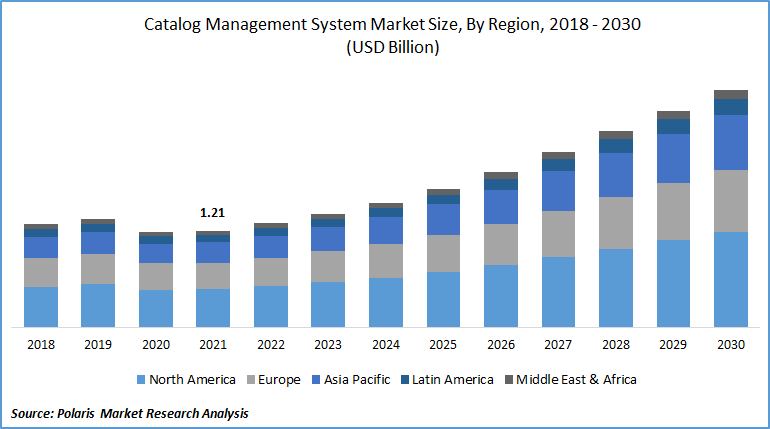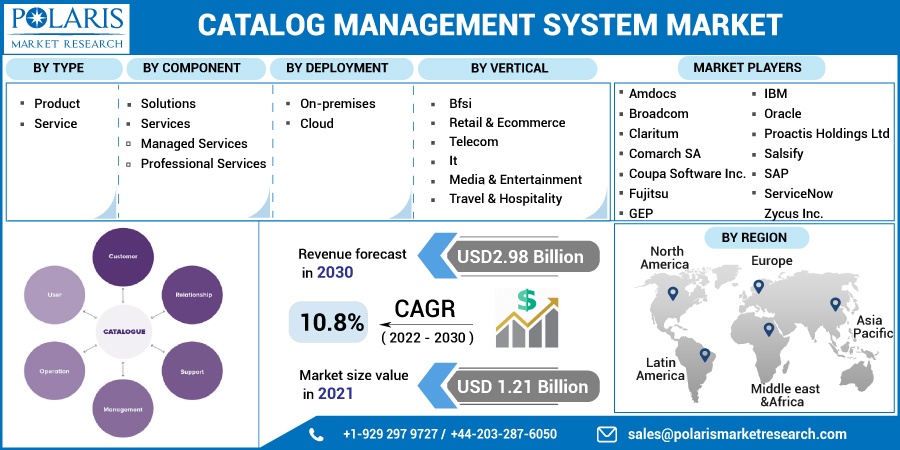
Catalog Management System Market Share, Size, Trends, Industry Analysis Report, By Type (Product Catalog, Service Catalog); By Component (Solutions, Services); By Deployment (On-premises, Cloud); By Vertical; By Region; Segment Forecast, 2022- 2030
- Published Date:Jun-2022
- Pages: 114
- Format: PDF
- Report ID: PM2342
- Base Year: 2021
- Historical Data: 2018 - 2020
Report Outlook
The global catalog management system market was valued at USD 1.21 billion in 2021 and is expected to grow at a CAGR of 10.8% during the forecast period. Key factors such as the benefits of these system, cloud system deployment, and adoption of this from the eCommerce & retail sectors are boosting the catalog management system market growth during the forecast period.

Know more about this report: Request for sample pages
Rising client expectations, the requirement for highly centralized product and service data, and an increase in the quantity of digital transformation initiatives in the retail and eCommerce sector verticals are all contributing causes to the industry's expansion. Due to a rising need to streamline selling procedures, these solutions are used throughout business sectors. Additionally, the catalog administration structure market for will see a substantial surge in cloud deployment strategies. Interactive visualizations, flexibility, improved security, and increased scalability are essential factors that can persuade businesses to embrace cloud deployment.
For example, according to VMware data, the global cloud system management software industry expanded by 33.2% in 2018 and was valued at roughly 5.6 billion U.S. dollars. Customers worldwide are becoming more tech-savvy and prefer to communicate with companies through online platforms like social media, mobile applications, and websites. As a result, the customer experience, requirements, and feedback are now the only emphasis of this industry vertical, promoting technology adoption.
Additionally, as consumer demand for goods rises along with internet access and smartphone usage, the eCommerce industry has been growing quickly. Online sales have increased dramatically around the globe. The eCommerce industry is growing swiftly in the Philippines, Mexico, India, and China.
This reduces the cost-of-service delivery, improves customer satisfaction, increases employee efficiency, and improves the overall operation of enterprises. The eCommerce & retail sector vertical is designing consumer engagement channels to meet the needs of digitally evolved consumers. Surging SME use and developments in Machine Learning (ML), Artificial Intelligence (AI), and analytics drive industry growth. However, present data security concerns and a lack of information about the functions and benefits of the catalog management system market may stifle industry expansion.
The main barriers to implementing the catalog management structure are data security concerns. Users specifically avoid using these administration system because of concern that data mistakes during compilation or updates might result in the loss of important master and reference data. Users feel that their data is at risk of being stolen or lost, that no one will be held responsible, and that no mitigation will be provided. Users are also worried about the reliability of their data.
 Know more about this report: Request for sample pages
Know more about this report: Request for sample pages
Industry Dynamics
Growth Drivers
Expanding customer demand for products, adopting ML and AI to improve the consumer experience, increasing internet access, and enhancing smartphone prevalence are predicted to boost industry expansion, acting as a stimulus for catalog management system from the e-commerce businesses. The availability of mobile has improved business adoption of mobile apps, social media, and online platforms, resulting in increased participation in retail and e-commerce through those channels. Customer satisfaction has emerged as a critical goal for businesses. As a result, they are planning customer engagement channels.
Recent technologies, such as artificial intelligence (AI), are predicted to substantially improve such system capabilities, providing tremendous development potential to the catalog management system market. According to the GSMA, mobile devices reached 64% in 2019 and will reach 81% by 2025. At the same time, mobile subscriber penetration is predicted to reach 60% that year. As a result, smartphone adoption is growing in Asia Pacific, and rising purchasing power fuels the industry growth. Also, as per the ITU, in 2019, around 59% of the population used the internet.
Additionally, by predicting data quality concerns and offering suitable solutions to improve data matching and prevent data inconsistencies, ML-enabled catalog management capabilities help enterprises manage compliance, accelerate data-driven digitalization, and improve operational efficiency. Businesses like IBM are already offering ML-enabled catalog management system. According to projections, the need for these system will increase, encouraging new developments in catalog management system.
Report Segmentation
The market is primarily segmented based on type, deployment, component, vertical, and region.
|
By Type |
By Component |
By Deployment |
By Vertical |
By Region |
|
|
|
|
|
Know more about this report: Request for sample pages
Insight by Component
The services segment is expected to be the most significant revenue contributor in the global market. The catalog management system market is divided into two groups based on solutions: professional and managed services. These services assist employers in operating and ensuring the proper operation of product information.
To reduce downtime during and after solution installation, businesses need active assistance from skilled staff. These services help preserve business process effectiveness, promote business development, and save needless operational expenditures.
Geographic Overview
North America had the largest revenue share. The presence of significant manufacturers and companies in the region accounts for the region's largest market share. The area has been one of the quickest in technology adoption and IT infrastructure optimization, which has boosted the global catalog management system market.
Europe is predicted to have the second-largest industry share after North America throughout the projection period. The region is projected to be driven by a significant need to deliver extensive and reliable product information to ensure project information quality across all retail channels.
Moreover, Asia Pacific is expected to witness a high CAGR in the global market. Rapid economic growth, digitalization, globalization, and rising usage of cloud-based technologies are projected to drive the catalog management system market in the Asia Pacific. The Asia Pacific catalog management market is predicted to grow due to the region's SMEs' increased usage of catalog management services. The country's e-commerce sector is expected to drive the catalog management market during the forecast period.
Competitive Insight
Some of the major players operating in the global market include Amdocs, Broadcom, Claritum, Comarch SA, Coupa Software Inc., Fujitsu, GEP, IBM, Oracle, Proactis Holdings Limited, Salsify, SAP, ServiceNow, Telefonaktiebolaget LM Ericsson, and Zycus Inc, among others.
Catalog Management System Market Report Scope
|
Report Attributes |
Details |
|
Market size value in 2021 |
USD 1.21 Billion |
|
Revenue forecast in 2030 |
USD 2.98 Billion |
|
CAGR |
10.8% from 2022 - 2030 |
|
Base year |
2021 |
|
Historical data |
2018 - 2020 |
|
Forecast period |
2022 - 2030 |
|
Quantitative units |
Revenue in USD billion and CAGR from 2022 to 2030 |
|
Segments covered |
By Type, By Deployment, By Component, By Vertical, By Region |
|
Regional scope |
North America, Europe, Asia Pacific, Latin America; Middle East & Africa |
|
Key Companies |
Amdocs, Broadcom, Claritum, Comarch SA, Coupa Software Inc., Fujitsu, GEP, IBM, Oracle, Proactis Holdings Limited, Salsify, SAP, ServiceNow, Telefonaktiebolaget LM Ericsson, and Zycus Inc. |
